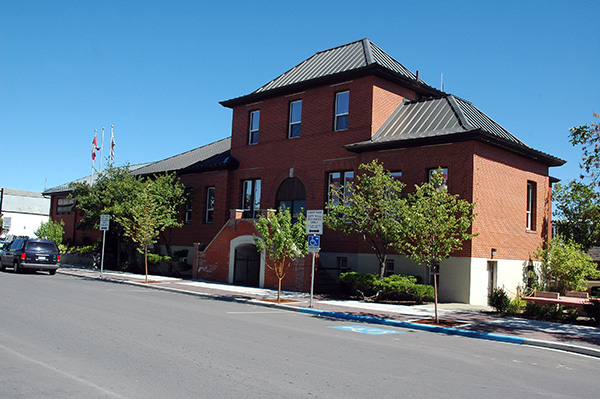Home »

Would-be team owners share concerns about city hall
A group of Cranbrook and area residents, including National Hockey League great Scott Niedermayer coined the Sinclair-Epp Group, that endeavoured to bring a minor hockey team to Western Financial Place following the departure of the Kootenay ICE, has stated in a letter to the City of Cranbrook and local media that it has concerns about how decisions are being made at city hall.
 The would-be hockey team owners said they are “disappointed in the process and the tactics of the city during this negotiation. The fact that they denied a sub-lease may have risked hundreds of thousands of dollars in liability from the existing tenant shows their resolve to have the outcome they wanted.
The would-be hockey team owners said they are “disappointed in the process and the tactics of the city during this negotiation. The fact that they denied a sub-lease may have risked hundreds of thousands of dollars in liability from the existing tenant shows their resolve to have the outcome they wanted.
“Further, it’s concerning that two to three people get to make a decision for the city that has implications for decades to come with little to no input from other elected officials or Cranbrook’s population.”
The following is the letter in its entirety, with city comments following.
“Our group has been asked by various council members and some city officials to comment on the process described in our media release last week.
The objective of this letter is to give the council an understanding of the process. We are not looking for any re-consideration of our group and have ceased operation as it pertains to hockey within the city.
As you know the city did a rebuttal release on Friday, and that release contained some false statements. We are providing this to council as requested and further consider this matter closed for our purposes. We did provide a business and marketing plan to the city months ago and noted much of this information in that submission including the details of our team of eight local investors.
Background and History
Our group entered into informal negotiations with the City of Cranbrook in the fall of 2018 by way of multiple discussions with the Mayor and other city officials. After the Kootenay ICE’s financial woes over the past seven years, long term financial viability became the key factor in any acquisition for our group.
The objective of these negotiations was to advise the city that we were interested in bringing a KIJHL (Kootenay International Junior Hockey League) team to the city for the fall of 2019. Our group submitted a request to the KIJHL and were completing its due diligence on the possibility of an arena lease.
The Mayor was clear in those meetings that the City of Cranbrook was not interested in Junior B hockey and was interested in Junior A hockey and specifically the BCHL. It was further advised by the Mayor that the decision on the future of hockey in Cranbrook was vested in (chief administrative officer) David Kim, (Leisure Services director) Paul Heywood and himself and that the council as-a-whole was excluded from this process.
The city noted that the BCHL offered a premier hockey league when compared to the AJHL and that the city could not negotiate until such time as the Kootenay ICE officially announced their rumoured move to Winnipeg. Further the Mayor was clear that they were willing to leave the arena empty in the fall of 2019. Our group held the position that continuity of hockey was a key part to the viability of any future team and that not operating in 2019 may mean a large attrition rate in corporate sponsorship and fan support.
Further, many aging people in Cranbrook rely on hockey for entertainment in the dark winter months, and the culture and success of minor hockey would be affected with no Junior team in the fall of 2019.
From November until late February our group undertook an extensive due diligence and feasibility study of the KIJHL, BCHL and AJHL and its long-term viability in Cranbrook. We had received information that the Kootenay ICE would be announcing their move to Winnipeg in late February and wanted to be prepared so there could be hockey in the fall of 2019 in Cranbrook. This analysis included our group using its vast resources to secure actual financials from comparable clubs within those leagues. Further we were able to establish a working relationship with the Kootenay ICE regarding their knowledge of the Cranbrook market.
Our findings were unanimous and unequivocal, the KIJHL presented the lowest long-term risk financially in Cranbrook. Further, it offered the best option to have local talent and to contribute to a hockey culture in Cranbrook that has been missing.
We further investigated the AJHL vs BCHL models as we had been advised by the Mayor that the city had no interest in KIJHL hockey. That investigation showed that the average cost difference between the two leagues in Cranbrook was roughly $400k, meaning the BCHL would cost roughly $400k more per year to operate than the AJHL (roughly $700K versus $1.1M). The appeal of the AJHL was also grounded in the fact that Cranbrook has substantial connection to Alberta with our geographic location (our minor hockey plays mostly in Alberta), a vast amount of people who work and have migrated from Alberta.
Finally, the initial cost for an AJHL team was $300k-$500k versus the BCHL price of $1.2M. Those numbers made it clear that the AJHL was the only financially viable long-term option for Junior A hockey in Cranbrook.
The BCHL poses major concerns for financial losses each year with a target average attendance of 1,700+ to break even. The travel in the BCHL is substantially higher and the lack of natural rivals restricts marketing opportunities. With shareholder cash calls and pressure on the season ticket base being a concern, the BCHL was not a feasible option.
Because of the findings of this extensive viability study, the group pursued an AJHL franchise and eventually secured a conditional purchase of the Calgary Mustangs. There were two relevant conditions; BC Hockey approval and City of Cranbrook lease approval.
Contrary to the city’s Global news interview, the AJHL did support having a team in Cranbrook and found it to be a natural fit, similar to the Flin Flon Bombers playing in the Saskatchewan league.
Our group was advised by Barry Petrachenko at BC Hockey that they would not approve an AJHL team in B.C. unless the City of Cranbrook supported it. BC Hockey further advised that the city had already spoken with BC Hockey and that the Mayor had noted that they wanted a BCHL team in Cranbrook.
It is important to note that this process took much of March and April and when advised that time was running out for hockey for the fall of 2019 the city was mostly unresponsive. We sent numerous emails from our legal counsel noting that time was of the essence with little urgency from the city.
Our group proceeded forward knowing that the BCHL may not approve a franchise in Cranbrook and further that a BCHL approval would not happen until the 2020 season. We were approached by a KIJHL team in mid-April to relocate to Cranbrook and reached a conditional purchase agreement contingent on securing a lease for an arena.
Our group and the Kootenay ICE reached an understanding in regard to their existing lease in early May. The Kootenay ICE would sub-lease their existing obligations to us and guarantee the liability owed to the city, in exchange our group would take over the final four years of the lease and operate a KIJHL team.
The Kootenay ICE presented this sub-lease to the city which guaranteed WHL revenue for the next four years and on May 30, hours before the deadline for relocation imposed by the KIJHL, the city sent a letter denying the approval of a sub-lease. Our group was surprised by this decision as the denial may put the city’s position to collect any liability owed by the current tenant in jeopardy for the city’s lack of mitigation.
City Press Release
The city noted in its press release that it wanted a fair and open process for a team moving into Cranbrook. From the beginning it was made clear that the city preferred a local group that was pursuing the BCHL in Cranbrook.
By noting in various meetings with numerous shareholders his preference with the BCHL the Mayor created a process that was targeted on one outcome. The concern from our group is that the financials and business groups should be making the decision on the model of hockey that works best in Cranbrook. From there the city should be the landlord and secure the best deal for the citizens. We were surprised that the city had such strong opinions on what level and type of hockey they felt was best, and further that they would forego Western Hockey League revenue for the next four years.
The city press release also stated that the city council must approve this process and lease. Our group was told on numerous occasions that city council has NO influence on this decision and that the decision on the future of hockey in Cranbrook sat with David Kim, Lee Pratt and Paul Heywood.
The city councillors were not part of the consultation process at any time. To mislead the public now that this is an open process for council is not consistent with what our group was advised throughout the process.
The final point regarding a tender in the city press release that seems inconsistent is the process of the questionnaire and subsequent comment that the city will have a decision in a couple of weeks. The questionnaire (which is being coined a tender) was sent to our group on May 29, and contains many leading questions that seem to be derived directly from our business and marketing plan that we submitted confidentially to the city.
Further the city had little or no movement on this lease since October and on May 29 gave all groups one week to submit answers to a lengthy questionnaire. There was no further tender information provided that would seem to be typical, valuations offered and a detailed process for the evaluation. The email simply noted that the answers would be scored somehow and the group with the highest score will be picked. The commercial lease and the terms of it were not even required. Our tender submission was guaranteeing the city WHL rates for the next four years.
We also note to council that we advised the city long ago that we had a May 31 deadline for a team in the fall of 2019 and as they did with our AJHL option, they stalled until they knowingly expired our timelines. The Mayor further went on Global to note that they city is a few weeks away from a decision. It seems out of line that the city took months to get to a targeted tender process that was released at a time that clearly expired any chance for a team in 2019 and then only needs a couple of weeks to decide on a long-term tenant for its arena.
Conclusion
To summarize, our group of local owners and hockey fans undertook a process to ensure there was hockey in Cranbrook for the fall of 2019. The city clearly expressed what their opinion was from the beginning and then undertook a process that ensured they reached their goal, regardless of the financial concerns that a BCHL team brings. The tender process was not a clear tender at all and in fact was put out with a week to submit, on the heels of our offer to guarantee WHL rates.
We are disappointed in the process and the tactics of the city during this negotiation. The fact that they denied a sub-lease may have risked hundreds of thousands of dollars in liability from the existing tenant shows their resolve to have the outcome they wanted.
Further, it’s concerning that two to three people get to make a decision for the city that has implications for decades to come with little to no input from other elected officials or Cranbrook’s population.
We do, however, understand that Cranbrook will have hockey again at some point and we hope that its long-term viability is the focus so our citizens can enjoy our most popular sport without the pressures of financial instability weighing on them.
The citizens of Cranbrook deserve uninterrupted, long-term junior hockey, with exciting playoffs, loud crowds and local talent to cheer on. They deserve a local ownership group that understands Cranbrook and is able to adapt to the community’s needs.
We wish the group that eventually brings a team to Cranbrook success, and look forward to assisting if possible. This clarifies and ends this matter for our group.”
Colin Sinclair, Kevin Epp, Scott Niedermayer, Daryl Cuthill, Trevor Gordon, Jason Meisner, Mark Salvador
Cranbrook
Contacted by e-KNOW for comments on this letter, the city forwarded the following, quoting Paul Heywood, as per an interview conducted by Cranbrook Townsman reporter Trevor Crawley.
1) Did the mayor stick to a preferred option with the BCHL?
“There was a fair and open process opened through BC Bids and the group didn’t submit any materials through this public process to the City of Cranbrook. They were made aware of the process by staff and directly asked to submit- which they didn’t do.”
2) Why was the sublease decision not made by council and on what authority are these decisions made
“The Kootenay ICE have left the premises and set up operations in another city, which is just cause for the City of Cranbrook to legally question their ability to assign the lease to another entity.
3) The Sinclair/Epp Group alleges the city risked ‘hundreds of thousands of dollars’ in liability from the existing tenant (ICE) by denying a sublease. Is that true and/or does the city wish to respond to that allegation?
“The sublease would be a short bandage rather than a long-term deal and could be a way to enter into an exclusive contract that was determined by the ICE regardless of the team’s qualification.
The City of Cranbrook will not comment further on the Sinclair/Epp group’s speculations.”
4) From the city’s contractual perspective, what comes first — does a prospective ownership group need a hockey governing board’s approval for a franchise first before pursuing a lease agreement or does the city need a lease agreement in place with a prospective ownership group first before it approaches a hockey governing board?
“A team cannot enter a lease with a city unless it has the appropriate league approval for expansion or relocation. Proof of league approval at all necessary levels was asked in the city process.”
Ian Cobb/e-KNOW







